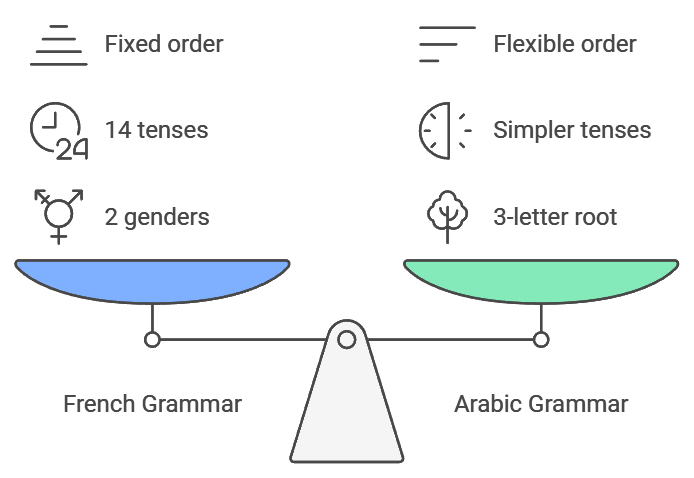Learning French vs Arabic: Which Language is Easier?
For English speakers, French is generally easier to learn than Arabic. While French requires about 600-750 hours to reach basic fluency, Arabic typically needs 2,200 hours. However, each language offers unique advantages and challenges that might make one a better choice for you, depending on your goals and learning style.
Key Takeaways
- French takes one-third the time to learn compared to Arabic
- Arabic offers higher career premiums in government sectors
- French shares many words with English (45% cognates)
- Arabic writing system is more logical than commonly believed
- Both languages provide strong professional opportunities
Time Investment Reality
Let’s look at what you’re really signing up for:
| Learning Aspect | French | Arabic |
|---|---|---|
| Study Hours to Fluency | 750 | 2,200 |
| Writing System Learning | 1 week | 4-6 weeks |
| Grammar Complexity | Moderate | High |
| Vocabulary Similarity to English | High | Very Low |
| Global Speakers | 275 million | 422 million |
Learning Progression
French Timeline:
- Basic (A1): 2-3 months
- Conversational (B1): 6-8 months
- Fluent (C1): 12-15 months
Arabic Timeline:
- Basic (A1): 6-8 months
- Conversational (B1): 18-24 months
- Fluent (C1): 36-48 months
Writing Systems Comparison
Here’s where many learners face their first big decision:
| Feature | French | Arabic |
|---|---|---|
| Alphabet Type | Latin | Arabic |
| Number of Letters | 26 + accents | 28 |
| Writing Direction | Left to right | Right to left |
| Letter Forms | One form | Up to 4 forms |
Grammar Face-Off
Think French grammar is tough? Let’s compare:
French Grammar Features:
- 2 genders (masculine/feminine)
- 14 verb tenses
- Fixed word order
- Articles required
Arabic Grammar Features:
- 3-letter root system
- Simpler verb tenses
- Flexible word order
- No articles needed

Professional Impact
Both languages can significantly boost your career:
French Career Benefits:
- 15-25% salary increase in business sectors
- Access to 29 French-speaking countries
- Strong in luxury, diplomacy, and arts
Arabic Career Benefits:
- 35-50% salary premium in government sectors
- High demand in intelligence agencies
- Critical in international relations
Modern Learning Methods
Today’s learners have powerful tools at their disposal:
| Resource Type | French Availability | Arabic Availability |
|---|---|---|
| Mobile Apps | Extensive | Growing |
| Online Courses | Abundant | Limited |
| AI Tools | Many | Few |
| Native Content | Extensive | Moderate |
Success Strategies
Want to make your learning journey easier? Here are proven tips:
- For French:
- Start with cognates
- Use music and movies
- Practice with native speakers
- Focus on pronunciation early
- For Arabic:
- Master the alphabet first
- Choose your dialect early
- Use handwriting practice
- Focus on root patterns
Making Your Choice
Still wondering which to pick? Ask yourself:
- Need faster results? Choose French
- Want government work? Pick Arabic
- Prefer familiar patterns? French wins
- Love linguistic challenges? Arabic might be your path
- Need more learning resources? French has more
- Want higher salary potential? Arabic offers more
The Bottom Line
Your success depends more on your:
- Learning style
- Time commitment
- Career goals
- Cultural interests
Remember, the “easier” language isn’t always the right choice. Consider these final factors:
| Factor | French | Arabic |
|---|---|---|
| Learning Resources | Very High | Moderate |
| Job Opportunities | Abundant | High-paying |
| Cultural Access | Easy | Challenging |
| Global Influence | Strong | Growing |
Ready to start? Pick the language that excites you most – motivation beats theoretical ease every time! Whether you choose the elegance of French or the depth of Arabic, your success depends more on your commitment than the language’s inherent difficulty.
Want to know the secret to success? Choose the language that makes you think “I can’t wait to learn this!” rather than “This seems easier.” After all, you’ll be spending hundreds of hours with your chosen language – make sure it’s one that truly interests you!
